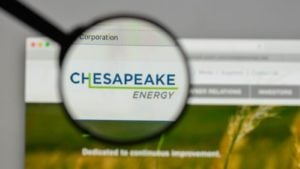Don’t Be One of Those People Betting on a Chesapeake Stock Rebound
Anything's possible, but CHK stock is almost certainly done
Chesapeake Energy (NYSE:CHK) is the very definition of a “dead man drilling.” As Saudi Arabia and Russia went to war over oil prices, and the Covid-19 pandemic got real, CHK stock did a 1:200 reverse split.

True, the circumstances were stacked against it.
As Thomas Gilbert, associate professor of Finance at the Foster School, University of Washington, wrote in an email to InvestorPlace, “The [oil] price collapsed so much that it went negative: you have to pay to NOT receive the oil. On top of that, US oil producers are hurting because of the price drop but their operating costs staying high. So many are cutting production, closing sites, and potentially closing permanently.”
The result for CHK stock is share are due to open May 26 at $14.30 each.
That’s a market cap of $134 million for a company on pace for 2020 revenue of $10 billion. The problem is the company’s debt, nearly $9.5 billion in its March 10-Q report.
Small wonder that InvestorPlace writers are unanimous in telling you to avoid this stock. Its recent rise is a dead cat bouncing. There’s no reason to buy. Don’t even think of buying the dip. Bankruptcy is coming.
Yet, somehow, over the last five trading sessions, shares are up 16%. What are speculators seeing that investors don’t?
The CHK Stock Bounce
Chesapeake, which pioneered the fracking of Appalachian shale a decade ago, is still the second-largest producer of American natural gas. According to futures markets, gas prices are headed up.
The June contract for natural gas is priced at $1.74/mcf. But the price for January delivery is nearly $3. Most of those gains should be held, for at least a year out. If Chesapeake can get there, it can benefit.
Not everyone has given up on Chesapeake. Peng Zhao hasn’t. The 38 year old Chinese-born entrepreneur, a member of Fortune’s “40 Under 40” list,, runs the Citadel Securities unit of Citadel LLC. It’s one of the leading market makers in the world. The parent company is a huge alternative asset manager.
A recent Chesapeake filing showed units of Citadel, and hedge fund CEO Kenneth Griffin, taking a big position in Chesapeake common.
Someone sees a potential profit. There’s a shark here preparing to feed.
Worth Getting In?
All this is part of a broad restructuring Chesapeake is undergoing, with the aim of saving something from its wreckage.
In March it hired restructuring lawyers at Kirkland & Ellis, the huge Chicago law firm, and investment bankers at Rothschild & Co., specialists in reworking debt.
These announcements, and the reverse split, got the new shares up to nearly $40 in late April, but they have since fallen back again. Speculators are listening to Chesapeake’s junk men.
Chesapeake has been warning investors it may be unable to stay in business. Then why, after reporting over $8 billion in losses for the March quarter, did it then adopt a “shareholder rights plan,” commonly known as a poison pill?
It’s because past losses remain an asset. At the end of 2019 Chesapeake had $7.6 billion in such losses, which can be used to offset profits. By the end of March it had $22 billion of accumulated losses. Its $8.5 billion loss in the March quarter wasn’t in the form of cash. It was in the form of impairment charges caused by writing-down assets. Chesapeake had positive operating cash flow of $397 million in the quarter.
The Bottom Line on CHK Stock
Chesapeake is looking for the softest possible landing.
It needs to keep the company whole to use those losses, possibly inside a bigger, profitable company. If it can continue to operate, Chesapeake can benefit from rising natural gas prices later in 2020. The company did report $2.5 billion in revenue during the March quarter, up from $2.2 billion a year earlier.
There is some complex financial engineering going on here. But big law firms and restructuring experts don’t come on board unless they see potential profits.
It’s a long shot, but that’s what today’s investors in Chesapeake common are playing. If the experts find Chesapeake a place to land, speculators think they can profit from it.
Dana Blankenhorn has been a financial and technology journalist since 1978. He is the author of the environmental thriller Bridget O’Flynn and the Bear, available at the Amazon Kindle store. Write him at danablankenhorn@gmail.com or follow him on Twitter at @danablankenhorn. As of this writing he owned no shares in companies mentioned in this story.